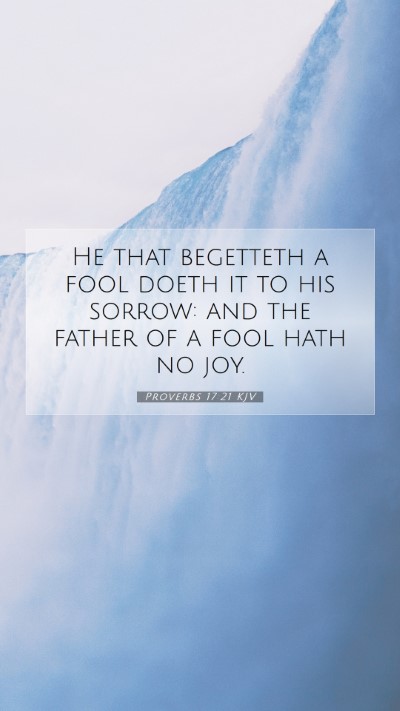Understanding Proverbs 17:21
Bible Verse: Proverbs 17:21 - "He who begets a scoffer does so to his sorrow, and the father of a fool has no joy."
Summary of Insights From Public Domain Commentaries
Interpretation by Matthew Henry
Matthew Henry observes that the verse highlights the profound impact of parenting on the character of a child. He emphasizes that when a parent raises a scoffer (someone who mocks and derides), it leads to sorrow and heartache. The verse serves as a reminder of the responsibility that comes with parenting, suggesting that the lifestyle and choices of children can reflect upon their parents, bringing them either joy or sorrow.
Insights from Adam Clarke
Adam Clarke interprets the second part of the verse regarding the father of a fool, indicating that it is a source of deep despair. He notes that wisdom is a precious trait in children, whereas foolishness leads to grief for the parent. Clarke further emphasizes the societal implications of raising foolish offspring, suggesting that the consequences extend beyond the family to the community. A fool’s actions can bring shame and dishonor to the family name.
Albert Barnes' Perspective
Albert Barnes provides a broader context by linking the themes of parental responsibility and the importance of guidance. He reflects on the notion that parents bear a significant burden when their children choose a path of foolishness or mockery of wisdom. Barnes emphasizes that the upbringing of children should involve nurturing their wisdom, as foolish behavior not only brings sorrow to parents but also can lead to moral degradation within society.
Application and Significance
Proverbs 17:21 speaks profoundly to the nature of parenting and the generational consequences of one’s actions. Understanding the meanings behind this verse can be invaluable for Bible study insights and Bible study groups that focus on familial relationships and personal conduct.
How to Apply This Verse to Daily Life
- Reflect on Parental Roles: Use this verse as a basis for evaluating your influence as a parent or mentor.
- Empower Your Children: Foster wisdom in your children through education and moral guidance.
- Seek Wisdom: Prioritize learning and growing in wisdom for both yourself and your family.
Cross References
- Proverbs 10:1 - "A wise son makes a glad father, but a foolish son is the grief of his mother."
- Proverbs 13:1 - "A wise son hears his father's instruction, but a scoffer does not listen to rebuke."
- Proverbs 15:20 - "A wise son makes a glad father, but a foolish man despises his mother."
Conclusion
This verse serves as a crucial understanding of parental influence and the outcomes of raising children, emphasizing the significance of imparting wisdom and moral values. For those exploring Bible verse meanings and scripture analysis, Proverbs 17:21 provides a foundational perspective on the dynamics of parenthood and foolishness.


